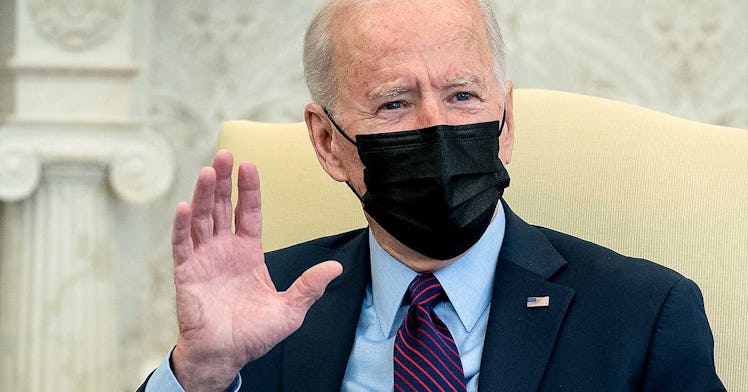Biden Stimulus: Senate Vote Confirms March Checks Are Likely
What you need to know about vote-a-rama, the minimum wage, and what happens next.

If your knowledge of how a bill becomes law starts and ends with “I’m Just a Bill” from Schoolhouse Rock, the goings-on in the Senate last night, which was a key night to advance Joe Biden’s stimulus package, may seem baffling. Why did the Senate hold a 15-hour, all-night session? Why was Kamala Harris called in to cast a tie-breaking vote at 5:30 in the morning? What does this actually mean for President Biden’s proposed COVID-19 stimulus relief package being fast-tracked through the budget reconciliation process to get people their stimulus checks?
Here’s everything you need to know.
The most important part: the $1.9 trillion Stimulus Package will move forward on schedule
Last night (or rather, this morning) ensured that the stimulus package will indeed move to the House, where Democrats alone can work on the package, write the bill, and pass it as soon as possible, on schedule.
But the reports about last night are deeply confusing: did the minimum wage get rejected? Did stimulus checks get limited? for example, — so here’s what you need to know about how that package was passed.
Why was there an all-night session for the COVID relief bill last night?
Joe Biden has consistently said that, while he’d prefer bipartisan support for his COVID-19 relief package, he’s willing to pass a bill solely with the support of Democratic lawmakers. The only way he can do that, apart from abolishing the filibuster, is with a special process known as budget reconciliation.
When Kamala Harris cast her first tiebreaking vote as vice president at 5:30 this morning, she was voting to approve a budget resolution that is essentially Step One of the budget reconciliation process. It came after a marathon of votes on amendments that are part of a Senate tradition known as vote-a-rama — in which the party in the minority essentially tries to force as many tough votes for the party in the majority as possible. One of the most reported aspects of last night’s vote-a-Rama was the striking down of the minimum wage increase, a big part of Biden’s stimulus package. But all may not be what it seems.
Which amendments passed during the vote-a-rama?
Sen. Joni Ernst of Iowa spoke in favor of her amendment to “prohibit the increase of the federal minimum wage during a global pandemic.” She said that “A $15 federal minimum wage would be devastating for our hardest-hit small businesses at a time they can least afford it. We should not have a one-size-fits-all policy set by Washington politicians.”
Bringing up the crush on small businesses is a classic Republican talking point, despite the fact that many if not most workers who are paid the minimum wage work for large corporations.
Sen. Bernie Sanders, the chairman of the Budget Committee, unexpectedly agreed with Ernst on the technicality that his plan would raise the minimum wage gradually, not during the pandemic, making her point moot. Ernst withdrew her demand for a recorded vote and the Senate moved on.
Besides the minimum wage, Republican-supported amendments that made it into the resolution would block tax increases on small businesses during the pandemic, establish a fund to help restaurants and bars, keep the U.S. embassy in Jerusalem (after Trump moved it there), compensate schools in places that lost oil and gas revenue due to Biden’s moratorium on such development on federal lands, provide tax relief to mobile healthcare workers, and prohibit stimulus money from going to undocumented people despite the fact that they pay billions in taxes.
What do the amendments do?
Pretty much nothing, actually! As we mentioned before, vote-a-rama votes are political posturing. They’re commonly used to force members of the majority into votes that form the basis of future negative campaign ads, though a few votes — like one on a vague amendment to not send stimulus payments to upper-income earners, which caught a lot of media attention — do attract bipartisan support.
All of the amendments, however, are non-binding, which means the final bill could either ignore those issues or come down on the other side of them.
What happens next?
The House should easily approve the budget resolution as early as today, which means that Congress can start writing the actual relief package that reflects Biden’s proposal and their own priorities. The deadline for the language of the bill to be finalized is February 16th. Look for Sanders, the chairman of the budget committee, to insert a minimum wage increase, for instance.
Democrats want to have the $1.9 trillion stimulus package passed by mid-March so that they can prevent a gap in coverage when the enhanced unemployment benefits currently on the book will expire without the extension that the new bill will contain. That means you could get your stimulus checks by mid-to-late March.